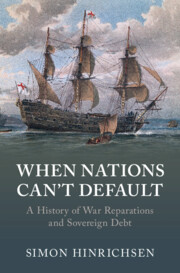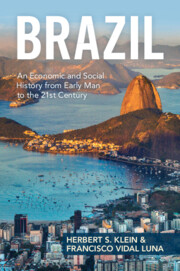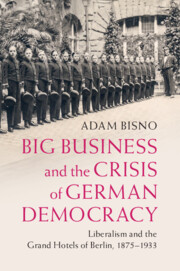Refine search
Actions for selected content:
26946 results in Economic history
Index
-
- Book:
- Big Business and the Crisis of German Democracy
- Published online:
- 19 October 2023
- Print publication:
- 02 November 2023, pp 215-223
-
- Chapter
-
- You have access
- Open access
- HTML
- Export citation
3 - Grand Hotels at War
-
- Book:
- Big Business and the Crisis of German Democracy
- Published online:
- 19 October 2023
- Print publication:
- 02 November 2023, pp 85-105
-
- Chapter
-
- You have access
- Open access
- HTML
- Export citation
10 - World War II Reparations to the Soviet Bloc
-
- Book:
- When Nations Can't Default
- Published online:
- 19 October 2023
- Print publication:
- 02 November 2023, pp 133-138
-
- Chapter
- Export citation
Copyright page
-
- Book:
- Big Business and the Crisis of German Democracy
- Published online:
- 19 October 2023
- Print publication:
- 02 November 2023, pp iv-iv
-
- Chapter
-
- You have access
- Open access
- HTML
- Export citation
Data and Replication
-
- Book:
- When Nations Can't Default
- Published online:
- 19 October 2023
- Print publication:
- 02 November 2023, pp xxi-xxii
-
- Chapter
- Export citation
Preface
-
- Book:
- Brazil
- Published online:
- 19 October 2023
- Print publication:
- 02 November 2023, pp xvii-xx
-
- Chapter
- Export citation
Figures
-
- Book:
- When Nations Can't Default
- Published online:
- 19 October 2023
- Print publication:
- 02 November 2023, pp xv-xvi
-
- Chapter
- Export citation
5 - Haiti Indemnity and Sovereign Debt
-
- Book:
- When Nations Can't Default
- Published online:
- 19 October 2023
- Print publication:
- 02 November 2023, pp 100-103
-
- Chapter
- Export citation
Copyright page
-
- Book:
- Brazil
- Published online:
- 19 October 2023
- Print publication:
- 02 November 2023, pp iv-iv
-
- Chapter
- Export citation
Dedication
-
- Book:
- When Nations Can't Default
- Published online:
- 19 October 2023
- Print publication:
- 02 November 2023, pp ix-x
-
- Chapter
- Export citation
Introduction
-
- Book:
- Big Business and the Crisis of German Democracy
- Published online:
- 19 October 2023
- Print publication:
- 02 November 2023, pp 1-7
-
- Chapter
-
- You have access
- Open access
- HTML
- Export citation
Index
-
- Book:
- Brazil
- Published online:
- 19 October 2023
- Print publication:
- 02 November 2023, pp 353-358
-
- Chapter
- Export citation

When Nations Can't Default
- A History of War Reparations and Sovereign Debt
-
- Published online:
- 19 October 2023
- Print publication:
- 02 November 2023

Brazil
- An Economic and Social History from Early Man to the 21st Century
-
- Published online:
- 19 October 2023
- Print publication:
- 02 November 2023

Big Business and the Crisis of German Democracy
- Liberalism and the Grand Hotels of Berlin, 1875–1933
-
- Published online:
- 19 October 2023
- Print publication:
- 02 November 2023
-
- Book
-
- You have access
- Open access
- Export citation
Political violence and financial markets in Tsarist Russia
-
- Journal:
- Financial History Review / Volume 30 / Issue 2 / August 2023
- Published online by Cambridge University Press:
- 06 October 2023, pp. 231-275
-
- Article
-
- You have access
- Open access
- HTML
- Export citation
FHR volume 30 issue 2 Cover and Front matter
-
- Journal:
- Financial History Review / Volume 30 / Issue 2 / August 2023
- Published online by Cambridge University Press:
- 06 October 2023, pp. f1-f2
-
- Article
-
- You have access
- Export citation
The meandering trajectories of financial innovations: commercial paper and its uses in sixteenth-century Lyon's trading networks
-
- Journal:
- Financial History Review / Volume 30 / Issue 2 / August 2023
- Published online by Cambridge University Press:
- 06 October 2023, pp. 198-230
-
- Article
-
- You have access
- Open access
- HTML
- Export citation
FHR volume 30 issue 2 Cover and Back matter
-
- Journal:
- Financial History Review / Volume 30 / Issue 2 / August 2023
- Published online by Cambridge University Press:
- 06 October 2023, pp. b1-b2
-
- Article
-
- You have access
- Export citation
Adam Smith's reversionary annuity: money's worth, default options and auto-enrollment
-
- Journal:
- Financial History Review / Volume 30 / Issue 2 / August 2023
- Published online by Cambridge University Press:
- 06 October 2023, pp. 162-197
-
- Article
-
- You have access
- Open access
- HTML
- Export citation
